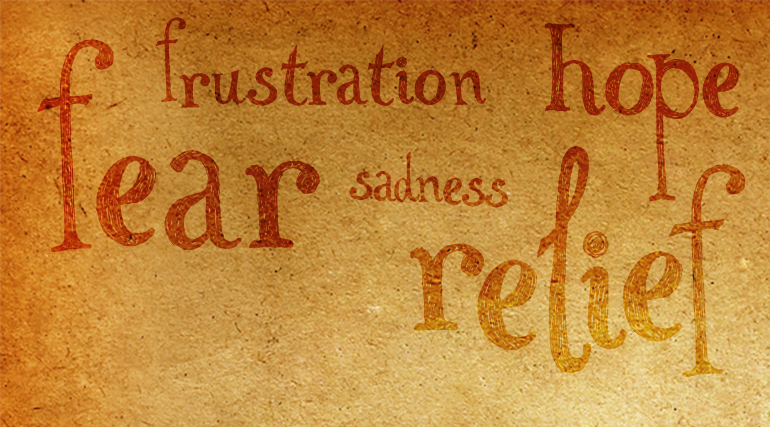When you reach the point in your fertility journey when the doctor says, “I’m sorry…we’ve done all we can do apart from egg donation, embryo donation, or surrogacy,” you are already emotionally bankrupt. You’ve tried so hard. You’ve spent endless energy and dollars in your longing to create a family. But tests, time, and tears have not produced results, so now you are wondering, what’s next? Do I give up my dream?
“I realized I had a deep desire to have a child who will carry on the traits of my family. It may sound selfish, but we chose surrogacy because I wanted to have a child who might be blessed with my mom’s musical talents or my dad’s sparkly eyes.”
—DAN
Taking stock of your feelings
One in eight couples struggles with infertility — and the intense emotions that come with it. Talk with your partner, talk to a counselor, or find a support group or an agency, and process this difficult time in a healthy, open way. Acknowledge everything you are feeling, and know that you are not alone. In a survey conducted by Building Your Family, here’s how some parents who’ve experienced egg donation, embryo donation, sperm donation, or gestational surrogacy described their mindsets as they began the (assisted reproduction technologies) ART process:
- “It was an unexpected and jarring revelation to face infertility. We had to come to terms with the fact that things would never be ‘simple’ for us when building a family.”
- “Frustration—you watch so many others effortlessly have children and wonder why it is so hard for you. Fear — there are so many unknowns to face, and you’ve already experienced many disappointments and setbacks at this point. Hope — the thing that keeps you going is the thought of finally having a child of your own to love.”
- “We felt intense grief upon the loss of genetic continuation, but upon accepting that we would try egg donation, we felt joy and excitement that this option existed. Prior to treatment, I also felt some jealousy of the donor.”
- “I felt like I was the ‘end of the line’ for several bloodlines in my family, and that made egg donation with gestational surrogacy a very difficult decision. I felt intense self-imposed pressure. Ultimately, however, I felt relief that we had a viable path to parenthood.”
- “We felt a range of emotions throughout the process–from questioning, worrying, and being scared prior to diagnosis to anger, hurt, frustration, and confusion after diagnosis. Once we decided on a path forward, there was relief and hope, but still worry and fear of the unknown.”
- “After choosing sperm donation, we were very concerned about choosing a donor who best resembled the non-carrying parent of our partnership. In the end, however, that didn’t matter. Once the child was conceived, it was ours.”
- “With advice from doctors and our own research, we decided on sperm donation with gestational surrogacy. We felt relief that we had answers to our questions and a plan in place that we believed would give us our best chance of being parents.”
- “Hopeful. Of course, I was hopeful when my husband and I started trying to conceive. Then five IVFs with my own eggs, which included a miscarriage, left me emotionally and physically exhausted. At that point, I knew in my gut it was time to move on to donor embryo. That decision made me feel hopeful in a new way, that I could get pregnant and stay pregnant.”
- “We’re in the process of an embryo donation. We were a little apprehensive, but mostly very excited to learn about this option that will let me experience pregnancy.”
Letting go of a genetic connection
If your doctor reports that you need an egg or sperm donor, or if you decide on embryo donation, you may grieve about losing the genetic link to your child. Take time to process this loss. Many intended parents focus on the joy of raising a child, regardless of physical characteristics. This child will be your family’s treasure…chosen, planned for, and delivered with great care.
Working with a reputable egg donor agency, sperm bank, or fertility clinic is critically important, as they can help find an ideal match from a broad spectrum of donors with various cultural backgrounds and physical characteristics. Egg donor agencies and fertility clinics often pre-qualify egg donors through requirements relating to age, health, education, and maturity.
One of your biggest decisions will be whether to choose a donor who is anonymous, semi-known, or known. An anonymous donor is one you will never meet. A semi-known donor is one who shares limited information. A known donor is a friend, a relative or, possibly, a stranger whom you have chosen through an agency and whom you will meet within agreed-upon boundaries.
Relinquishing the pregnancy experience
When thinking about the path to motherhood, most women assume that they will become pregnant and deliver a baby, and men may expect to nurture their partner as she carries their child. Learning that you or your partner cannot carry a pregnancy to term can be devastating. Again, it takes time to process infertility, the loss of this scenario.
Gestational surrogacy can allow one or both parents to retain a genetic connection to their child. If you choose this path, you can select a surrogate on the basis of her background and a face-to-face meeting, then remain in close contact during the pregnancy. Intended parents are often involved with prenatal care, attend doctor appointments, and are present for the birth.
“We were very skeptical,” said one mother-to-be about her twins’ carrier. “About 45 seconds into the conversation, we fell in love with her!” The parents soon realized that their surrogate shared the values of their family’s culture. After meeting the surrogate face-to-face, the mother-to-be said, “It was like it was meant to be! When we hugged, I felt like I was hugging my own sister.” Of course, not every surrogacy results in such kinship, but using a reputable agency’s selective matching process can significantly improve your results.
Are you ready to take the next step, beyond infertility?
Pause before making any decision and moving to the next step. Pamper your body and soul with a healthy diet, gentle exercise, and stress-busting rest and relaxation. Nurture your spirit with quiet meditation or prayer, according to your beliefs. Regroup.
When you decide to move on, learn all you can. Choosing whether donation or surrogacy is right for you requires arming yourself with knowledge, but help is at hand. Websites, organizations, and agencies offer information and consulting. Read first-person accounts by parents who have created a family with the help of others.
And finally, listen to your intuition. If a voice inside tells you to keep the dream of starting your family alive, there’s only one thing to do: Chase your dream!


